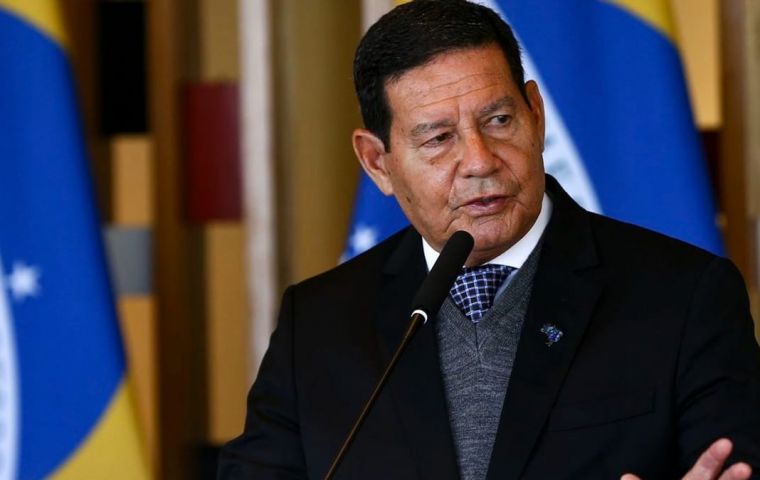MercoPress. South Atlantic News Agency
Arab countries announce investments in Brazil worth US$ 20 bn
 “Brazil has become the largest producer of halal protein in the world and is working to provide other products adapted to the customs and traditions,” Mourão explained
“Brazil has become the largest producer of halal protein in the world and is working to provide other products adapted to the customs and traditions,” Mourão explained Brazilian President Jair Bolsonaro Monday announced that the total investments of Arab funds in Brazil are approaching US$20 billion, half of that money stemming from the country's recent participation at the Expo Dubai event.
“The Arab world constitutes the third-largest market for Brazil abroad, only behind China and the United States. The trade flow between Brazil and the Arab league countries reached, in 2021, more than $24 billion, a record in the historical series. This figure is expected to continue rising. From January to April, Brazil's exports to the Arab world jumped from US$ 4 billion in 2021 to US$ 5.2 billion in 2022”, he declared, in a speech recorded for the opening of the Brazil & Arab Countries Economic Forum, in São Paulo.
In Bolsonaro's evaluation, Brazil's relationship with the Arab world has intensified over the years. Currently, there are 18 diplomatic representations in the 22 countries that make up the Arab League. In Brazil, the Arab community brings together 10 million people.
“At a time when the international community is seeking efforts to guarantee the world's food security, the link between Brazil and the Arab world is strengthened. Not even in the face of the challenges imposed by the pandemic have we stopped playing our role in the food supply. Brazil is today the largest exporter of halal protein in the world. Besides the trade of chicken and beef, our exports of sugar, soy, and wheat are also growing. On the other hand, 26% of the fertilizers that supply Brazilian agribusiness come from the Arab world,” he explained.
According to Bolsonaro, Algeria was, in 2021, Brazil's main trade partner on the African continent. Egypt, one of the largest markets for Brazilian beef in the world, is the first destination for Brazilian exports in Africa.
“In terms of imports, our main supplier on the African continent has been Morocco, a country that today occupies the position of the third-largest supplier of fertilizers to Brazil, behind Canada and Russia,” he said.
The fourth edition of the Brazil-Arab Countries Economic Forum is promoted by the Arab-Brazilian Chamber of Commerce. The initiative is dedicated to bilateral relations between Brazil and the 22 countries that form the League of Arab States. It features business delegations from Lebanon, United Arab Emirates, Egypt, Kuwait, Jordan, and other countries, with the participation of at least 120 businessmen.
“We have to stop looking at ourselves as mere supermarkets. Each one comes to the other's country and buys the product that is on the shelf,” Brazilian Vice President Hamilton Mourão argued Monday in closing statements at the Forum.
“We have observed that about 80% of Brazilian sales to Arab markets are of agricultural commodities, while approximately 90% of our imports from these same markets correspond to mineral fuels, fertilizers, and [other] essential inputs for our agricultural production,” he added, while calling for diversification of trade and services. “We need to climb the ladder of this relationship and advance in the areas of technology, investment, and really become strategic partners,” Mourão insisted.
The Vice President also pointed out that Brazilian exports to Arab nations have been growing since 2003 and, if taken together, would be Brazil's third main trading partner for exports and fifth for imports. “Brazil has become the largest producer of halal protein in the world and is working to provide other products adapted to the customs and traditions of the Islamic religion,” he added.
He also said that commercial partnerships with the Arab world gain a “strategic meaning” in the face of the impacts of successive crises throughout the 21st century, which include the “financial crash of 2008, political instability in different regions of the planet, increasingly frequent environmental disasters, geopolitical tension between the two largest economies in the world and, of course, the pandemic of COVID-19.”
“We need to work in partnership, in favor of initiatives that bring us mutual benefits, with greater resilience and security for our nations,” he proposed. Mourão also highlighted the outbreak of the conflict between Russia and Ukraine as another fact that creates instability in the world. “The Brazilian Arab Chamber of Commerce has contributed so that public and private sectors work with synergy to identify and exploit these opportunities.”
(Source: Agencia Brasil)




Top Comments
Disclaimer & comment rulesCommenting for this story is now closed.
If you have a Facebook account, become a fan and comment on our Facebook Page!